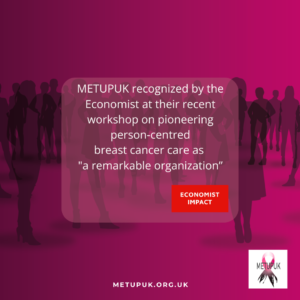At the End of May 2024 Madeleine attended an event at the offices of the Economist on Pioneering person-centred breast cancer care. This event was part of a wider project looking at care in Europe with a focus on five countries – France, Germany, Italy, Spain and the UK.

The participants were a mixture of clinician and nursing staff, and people from the charitable sector. I was the only patient present and was raising the voice of the metastatic breast cancer (MBC) community.
Discussions were wide ranging, and included barriers to accessing care, the state of person centric care and exploring patient centric solutions. The discussions were lively and every participant had much to contribute. The brief included discussions on “prevention” (reducing your risk), early detection, diagnosis and treatment, survivorship, quality of life and inequities.
One of my first comments was that breast cancer cannot be prevented, and so we should be discussing reduction of risk factors, which was agreed by all participants. Discussions around early detection were centred on breast screening. This included discussions on the most appropriate age to begin and end screening and the best intervals between tests. Dr Louise Wilkinson, consultant breast radiologist, made the excellent point that any changes to screening should be centred on finding cancer that will save lives, rather than detecting cancer in older populations who were likely to die from other causes.
During the discussions on treatment, I explained the impact that the change NICE processes is having on the metastatic breast cancer population. How the scrapping of the end of life criteria has meant that there is a reduced willingness to pay for metastatic breast cancer drugs, because the formula to calculate severity has classed MBC as a medium severity and not high severity disease. I cited Scotland as a country with a fairer drug appraisals system, and how the SMC PACE system (Patient And Clinical Engagement) was a kinder environment for patients to discuss with clinicians and health economists the impact of MBC.
During the discussions on survivorship, I explained how difficult this can be for patients with metastatic breast cancer. How patients ringing the end of treatment bell can be a very uncomfortable experience for people who will never end treatment until the day their oncologist tells them there is nothing more that can be done. For patients with an early diagnosis of breast cancer, I highlighted the importance of education about the signs and symptoms of recurrence and used the ABCD red flag Infographics as an example of good resource. I emphasised that giving patients written information was not enough. Oncologists and breast care nurses need to ensure that the information given is explained and that patients understand it. Too many patients tell us they were not given information on the signs and symptoms of recurrence, and yet many healthcare professionals believe that they do pass this information on. I also highlighted that many patients report red flag symptoms to their GP, but with 10 minute GP appointments and patients often seeing a different doctor on every visit, the risk of metastatic breast cancer can be overlooked. With patient initiated follow up to oncology, it needs the patient to make the connection between red flag symptoms and primary breast cancer, which may have been years ago. More GP training and better systems which flag a history breast cancer are needed.
Much of the focus on quality of life was about adherence of patients with primary breast cancer to endocrine treatment, and how patients are not given the support needed to manage symptoms. This is a real problem in both early and metastatic breast cancer, although patients with MBC tend to push through side effects because they know the alternative is no treatment. I did point out that even perfect adherence to endocrine therapy in early breast cancer does not prevent a patient from developing metastatic breast cancer, but only reduces the risk.
In the discussions about inequities, I covered access to clinical trials. We know that clinical trial investigators prefer to recruit patients with few pre-existing health conditions. At METUPUK, we refer to these patients as Cancer Olympians. If trial organisers could recruit people who run 10k before breakfast, then they would. Failing this, they try to recruit younger and healthier patients than are typical in a clinic. There are also disparities between geographical location and between whether patients are treated by research intensive oncologist/hospital or a local hospital which is not research intensive.
We were fortunate to have Sarah Adomah, a breast care nurse from the Marsden in the discussion who has done lots of work on raising awareness in black and ethnic minority groups in London. Sarah said she was not keen on the term “hard to reach groups” arguing that every group can be reached, you just need to go and find them. It was agreed that the NHS does put up barriers to access, particularly for people on low incomes of all ethnicities. For example, the need to call a GP at 8am when you need to be at work, the cost of taking time out of hourly paid work for appointments and travel costs to appointments are all barriers to seeking healthcare.
The same barriers could be said for patient advocacy, because positions are often unpaid and often do not pay expenses.
At the end of the event it was said that we could have spent three days on the agenda and not covered everything we wanted to say. For me, I would have liked to have explored more about the role of genomics in providing personalised care. Both what is on offer now, and what could be offered in the future.
This event was a very interesting discussion, with engaging, intelligent and forthright women. This report only covers a fraction of what was said, with an emphasis on the metastatic breast cancer content.

